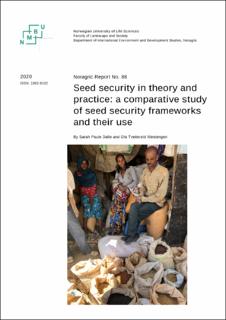| dc.contributor.author | Dalle, Sarah Paule | |
| dc.contributor.author | Westengen, Ola Tveitereid | |
| dc.date.accessioned | 2021-03-11T14:03:32Z | |
| dc.date.available | 2021-03-11T14:03:32Z | |
| dc.date.issued | 2020 | |
| dc.identifier.issn | 1892-8102 | |
| dc.identifier.uri | https://hdl.handle.net/11250/2732942 | |
| dc.description | The current report is based on a study commissioned by Norad in 2018. The report was updated and adapted in 2020 as part of the project Access to seeds funded by the Research Council of Norway. | en_US |
| dc.description.abstract | Seeds and planting material are fundamental assets in all crop production and thus at the heart of food system resilience. The ongoing Covid-19 pandemic and the health policies meant to break chains of virus transmission are also affecting the chains of seed transmission around the world. The humanitarian sector as well as the commercial seed sector have called on policymakers and other actors to take measures to allow seed flows to continue in the various social networks and value chains farmers rely on. In this context, the concept of seed security and its practical operationalizations in humanitarian and development interventions is more relevant than ever.
In 2018, Noragric carried out a study commissioned by the Norwegian Agency for Development Cooperation (Norad) entitled Seed security in theory and practice: contributions in the Norwegian aid sector. The current publication is an adapted and updated version of that study. We believe the historical and comparative focus in this report is of value to a broader readership, especially given the current surge in interest in seed security. The SeedSystem.org website is a tremendous source of information, statements, guidelines and tools for seed security assessments and interventions and we highly recommend this source to everyone interested in the latest updates on seed security development under the global pandemic. From the breadth of actors involved and the content of the joint organizational statements and guidance it seems the current crisis is about to lead to the much needed expansion of the seed security concept from the humanitarian sphere into long-term seed system development work called for in this report.
More than two decades of research and experience in seed security work has yielded salient lessons for how seed matters are handled in the current crisis. Warning against seeing the crisis as an opportunity to roll out universal and standardized seed development interventions, the scholars and practitioners in the field rather urge all development actors to base all actions on evidence and to first and foremost focus on strengthening the existing seed systems farmers use.
We hope this report will be useful for practitioners, policymakers and scholars interested in understanding and discussing the perspectives and frameworks used to gauge farmers’ seed systems and seed security situation. The diversity of approaches compared in this report is itself a healthy sign for a literature and practice field that must remain able to constantly adapt to new realities on the ground. | en_US |
| dc.language.iso | eng | en_US |
| dc.publisher | Norwegian University of Life Sciences, Ås | en_US |
| dc.relation.ispartofseries | Noragric report;86 | |
| dc.rights | Navngivelse-Ikkekommersiell 4.0 Internasjonal | * |
| dc.rights.uri | http://creativecommons.org/licenses/by-nc/4.0/deed.no | * |
| dc.title | Seed security in theory and practice : a comparative study of seed security frameworks and their use | en_US |
| dc.type | Report | en_US |
| dc.subject.nsi | VDP::Agriculture and fishery disciplines: 900::Agriculture disciplines: 910::Plant breeding, horticulture, plant protection, plant pathology: 911 | en_US |
| dc.source.pagenumber | 37 | en_US |

